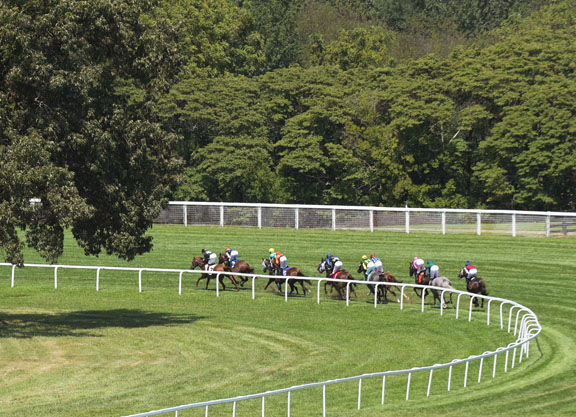It's easy to see why so many top American stables have made a point of circling the Kentucky Downs meet on their calendars. It mainly comes down to the money. During the unique European-style six-day meet, $10 million alone will be paid out in stakes purses, there are three $1 million races, maiden races go for $125,000 and the purses for allowance races range from $135,000 to $145,000. This year, Chad Brown will be there and so will Wesley Ward, Brad Cox, Bill Mott, Steve Asmussen and many other top stables.
Yet, the story of Kentucky Downs and its purses, among the best in the world, has apparently not traveled across the Atlantic Ocean. From Europe, there has been little to no participation at the annual meet that runs through the early part of September.
“We're the track they've never heard of,” said Kentucky Downs Director of Racing Rick Hammerle.
It's something Kentucky Downs management is hoping to change.
The Kentucky Downs team has decided to make a concerted effort to attract European horsemen, which includes a post COVID-19 trip in 2022 to meet top trainers in person. In the meantime, they're doing everything they can to get their story out, and they have a long list of talking points. It starts with the purses.
A new record will be set this year with $14,903,000 in purse money, which averages out to $2,483,833 a day. It must be noted that, due to funds provided by the Kentucky Thoroughbred Development Fund (KTDF), only Kentucky-breds run for the full listed purse. But even absent that contribution to the purse, the pots are still huge. Generally, about 50 to 60% of the total purse is available to all horses.
“It's kind of surprising that more European horses haven't come over for the Kentucky Downs meet,” said Fergus Galvin, the U.S. racing advisor for Qatar racing, which has been a big supporter of Kentucky Downs. “Quite a bit of the money is tied in with the KTDF money that is built into the purses, but, leave that aside, and the purses are still tremendous, especially when you compare them to what these horse might be running for in Europe. They have races for every category and at every distance, for sprinters, for milers, for route horses. There are a lot of opportunities.”
Hammerle hopes European stables will focus in not on a single race or two but the entire meet. It would make perfect sense for a stable to bring over six or seven horses.
“There are a lot of reasons why people put horses on a plane,” he said. “It's not always for the Breeders' Cup or for a certain race for a certain caliber of horse. It would be great to have Breeders' Cup horses, but there is a whole caliber underneath. You can think of this as something like the Dubai Carnival. Those horses run for a lot of money and not all of them are horses you'll see back on the World Cup card. Historically, people in Europe don't think of a race meet as something to point towards. We'd like to change that.”
There have been a number of horses to win at Kentucky Downs that have started their careers in Europe before moving into U.S. stables. Many of them would not have been considered top-tier horses overseas, but, like many Europeans horse before them, have found that the competition in U.S. grass races is not as strong as it is in England, Ireland and France. Kentucky Downs has also been held back by the graded stakes committee's slow response to its ascendancy. Even with those purses, there are no Grade I races at the meet and only six of the 16 stakes are graded.
Galvin said you wouldn't necessarily need to bring a star over to come away with a lucrative stakes win.
“You wouldn't have to bring over the cream of the crop to be very competitive down there,” he said. “Obviously, the best turf horses in the world are normally based in Europe. So there is a great opportunity for maybe a second-tier type horse to be competitive in any type of race.”
For those who have the ability to perform in the Breeders' Cup, Kentucky Downs also make sense. They can make just one trip to the U.S., run at Kentucky Downs, maybe at Keeneland in the following weeks, and then go to the Breeders' Cup. That will be a particularly attractive option in 2022 when the Breeders' Cup will be just up the road at Keeneland.
It's usually fairly warm and dry in southern Kentucky in September, so Kentucky Downs may also present an opportunity for European horses that like the firm going, something that is often not available overseas at that time of the year. The layout of the track is another factor that should help European shippers. With its undulations, sweeping turns and long stretch, Kentucky Downs is the closest thing the U.S. has to a typical European race course.
Hammerle understands that there won't be an influx of horses overnight, but he's confident that once a handful come over the word will start to get out and others will follow.
“If we start with one or two coming over and a few people experiencing it, they are going to go back and share their experience with people,” he said. “That can only help us. Maybe in five years or so we can be lucky enough to have, say,10 shippers on a card. If they come over, I can't imagine they'll regret it. Not with the money we have for our purses.”
Not a subscriber? Click here to sign up for the daily PDF or alerts.






